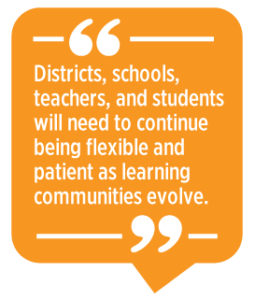Supporting Dually Identified English Learners
Online learning, distance learning, homeschooling, and virtual meetings have become more common phrases and practices over the past couple of weeks. The digital divide has been more evident than ever as students are encouraged to continue learning online while sheltering in place. For some learners, these expectations are not as easy to attend to as one might think. For English learners (ELs) who may be identified as having one or more learning challenges and/or be identified as gifted, how are their needs being met?
Dually Identified Learners and the Law
Part of the federal guidance around supporting ELs with learning disabilities states:
ELs with disabilities may need accommodations for instruction and assessment. Decisions about whether to use accommodations, and what accommodations to use, should be made on an individual student basis and consider each student’s needs and past and present level of performance. Accommodations should also be written in the [individualized education program]. (U.S. Department of Justice & U.S. Department of Education, 2016, p. 15)
The U.S. Department of Education, Office of English Language Acquisition has an entire chapter in Tools and Resources for Addressing English Learners with Disabilities (2016) regarding support for these dually identified learners. Key points from Chapter 6 include the following. Local education agencies must:
-
- identify, locate, and evaluate ELs with disabilities in a timely manner.
- consider the English language proficiency of ELs with disabilities in determining appropriate assessments and other evaluation materials.
- provide and administer special education evaluations in the child’s native language, unless it is clearly not feasible to do so, to ensure that a student’s language needs can be distinguished from a student’s disability-related needs.
- not identify or determine that EL students are students with disabilities because of their limited English language proficiency.
- provide EL students with disabilities with both the language assistance and disability-related services they are entitled to under federal law.
(U.S. Department of Education, 2016, p.1)
Dually Identified Learners and Online Learning Environments
To what extent mandates be executed as intended in online learning environments hasn’t been fully evaluated. U.S. Secretary of Education Betsy DeVos has recently been weighing options to waive mandates from the Individuals With Disabilities Education Act (IDEA) during the COVID pandemic (see “Questions and Answers on Providing Services to Children With Disabilities During the Coronavirus Disease 2019 Outbreak”).
 The waiver would give districts limited flexibility around assessment requirements and transitioning from face-to-face service models to online models. The proposed waiver has been met with resistance as advocacy groups expressed their concerns about the possibility of temporary changes to the mandate. Some of their concerns are around issues of clarity; expected implementation plans; and adhering to both state and federal mandates regarding equal access, including online learning, for students with disabilities.
The waiver would give districts limited flexibility around assessment requirements and transitioning from face-to-face service models to online models. The proposed waiver has been met with resistance as advocacy groups expressed their concerns about the possibility of temporary changes to the mandate. Some of their concerns are around issues of clarity; expected implementation plans; and adhering to both state and federal mandates regarding equal access, including online learning, for students with disabilities.
Such concerns are valid; as such, districts, schools, teachers, and students will need to continue being flexible and patient as learning communities evolve. Some considerations to keep in mind while providing support virtually to dually identified learners include
-
- the students’ IEP goals,
- how students were performing academically prior to schools being closed,
- what opportunities may be available for students to continue working on goals with support, and
- how performance evaluation will be monitored and shared with students and parents/guardians.
What You Can Do
Continue Learning
TESOL offers a course called Supporting English Learners With Exceptional Needs. This course would be beneficial for those who want to participate in a learning community with a shared interest in learning more about the needs of this student population.
TESOL Press also offers a book, Supporting English Learners With Exceptional Needs, by Doran and Noggle. What’s especially helpful about this book is the practitioner-friendly approach and accessible resources. They also offer a chapter each on high- and low-incidence disabilities. This is particularly helpful in being able to understand the differences between various disabilities so that educators can be better prepared for addressing student needs, whether face-to-face or online. The real-life vignettes and discussion questions can be used across various contexts, such as virtual meetings and professional learning sessions.
Lean In
Here are a few other organizations that may be of interest right now:
-
- The Council for Exceptional Children (offering a complimentary membership now through 31 May)
- the Educating All Learners Alliance
- the National Association of Special Education Teachers
These organizations offer a number of resources for both the novice and more experienced educator/advocates, and all currently have news and resources related to teaching and learning during the coronavirus crisis.
Next month’s blog will be about ELs who have reached proficiency in English and have exited their English language programs and/or been “reclassified.” We’ll discuss how exit criteria are determined and what the implications of such processes are for students and the teachers who support them.
Reference
U.S. Department of Education. (2016). English learner toolkit for state and local education agencies (SEAs and LEAs). https://www2.ed.gov/about/offices/list/oela/english-learner-toolkit/index.html

